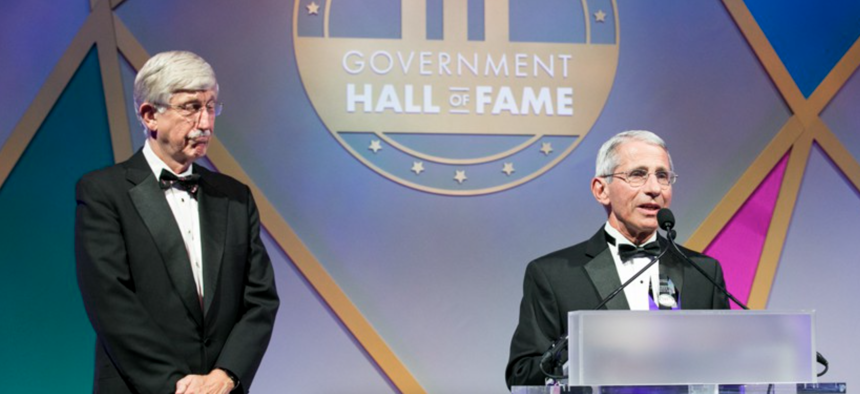Presenting the Government Hall of Fame Class of 2022
Joining a distinguished roster of inductees, they’ll be honored at a gala celebration on May 12.
Three years ago, Government Executive created the Government Hall of Fame with a simple purpose: to recognize those people—some world-famous, others virtually unknown—who have made historic advances in achieving government’s aim of serving the American people. Since then, a distinguished group of heroes, ranging from Clara Barton to Anthony Fauci, have been inducted into the hall.
This year, we’re taking the Hall of Fame to a whole new level by combining it with the Federal 100, an annual list prepared by FCW of women and men who personify what’s possible in the federal government, especially in the area of information technology. Since Government Executive and FCW have joined forces under the GovExec corporate banner, we decided it was only natural to bring the two prestigious awards programs together in one gala. That event, An Evening of Honors, will take place on May 12 at the Washington National Cathedral.
Here are the members of the Class of 2022 of the Government Hall of Fame:

Francis Collins
An M.D. and a Ph.D. in physical chemistry, Collins devoted much of his life to molecular genetics and made several important discoveries, which led to his appointment in 1993 to lead the agency managing the Human Genome Project. The National Human Genome Research Institute finished its work in 2003. In 2009, President Obama appointed him director of the National Institutes of Health, where he served under three different administrations. He retired at the end of 2021. Collins was awarded the Presidential Medal of Freedom by President George W Bush in 2007.

Patricia Roberts Harris
Harris was the first African-American woman to hold a Cabinet position. She served as secretary of Housing and Urban Development and later headed the Department of Health, Education and Welfare (which became Health and Human Services while she was leading it) in the Carter administration. Earlier in her career, Harris served as ambassador to Luxembourg, the first Black woman to be named to such a post. She arranged for an endowment to be created after her death in 1985 to provide stipends for Howard University students to participate in public service internships.

Walter Hollis
Hollis served for 56 years at the Defense Department, including 26 years as the deputy undersecretary of the Army for operations research until his retirement at the age of 80 in 2006. He was the highest ranking civil servant in the Army and in charge of Operations Research, Systems Analysis and Operational Test and Evaluation. This made him an extremely influential figure in the system development and procurement process. Collins was highly respected for his willingness to buck the Army hierarchy to avoid costly mistakes.

Shirley Ann Jackson
A renowned theoretical physicist, Jackson is the first African-American woman to receive a doctorate from M.I.T. in any subject. In 1995 she became both the first woman and first African-American to serve as chairperson of the Nuclear Regulatory Commission. During her tenure, she instituted crackdowns on the nuclear power industry’s violations and assured NRC’s commitment to public health and safety. She was awarded the National Medal of Science, the nation’s highest honor for contributions in science and engineering, by President Obama in 2016.

Charles McGee
A member of the famed African American fighter pilot unit known as the Tuskegee Airmen, McGee flew a total of 409 combat missions in World War II, the Korean conflict and the Vietnam War. In the process, he won the Distinguished Flying Cross, the Legion of Merit, the Bronze Star, the Air Medal and the Presidential Unit Citation. In 2020, President Trump promoted him from the rank of colonel to brigadier general. McGee died at the age of 102 in 2022.

Ely S. Parker
In 1857, Parker, a Seneca Indian who was educated as both a lawyer and an engineer, was appointed by the Treasury Department to oversee the construction of a customs house in Galena, Ill. There he became acquainted with Ulysses S. Grant, and served on the general’s staff during the Civil War. In that role, Parker made the formal copy of the terms of surrender presented at Appomattox. When Grant was elected president, he appointed Parker commissioner of Indian affairs, the first Native American to hold the post.

Elmer Staats
Staats shaped the Government Accountability Office (then known as the General Accounting Office) over four presidential administrations. In a federal career spanning 50 years, he worked in the Bureau of the Budget beginning under President Franklin Roosevelt in 1939. After several promotions, he became comptroller general in 1966. There he broadened GAO’s work, conducting high-impact oversight of federal elections, Vietnam War spending, energy, consumer protection and other issues.

Marshalyn Yeargin-Allsop
A pioneer in tracking the prevalence of autism among children, Yeargin-Allsop is chief of the developmental disabilities branch at the Centers of Disease Control and Prevention. After joining the CDC in 1981, she saw the need for better information on developmental disabilities among children. She devised an innovative study to address the issue, leading to a movement to provide better services to children with such disabilities. Yeargin-Allsop was the recipient of the 2018 career achievement award in the Service to America Medals program.
IN GOOD COMPANY
The members of the distinguished class of 2022 join those who have already been inducted into the Government Hall of Fame:
- Madeleine Albright
- Apollo 11 Astronauts: Edwin “Buzz” Aldrin, Neil Armstrong, and Michael Collins
- Clara Barton
- Hubert T. Bell
- Lonnie Bunch III
- Ralph Bunche
- George H.W. Bush
- Rachel Carson
- David O. “Doc” Cooke
- Frederick Douglass
- Tammy Duckworth
- Anthony Fauci
- Robert Gates
- John Glenn
- Virginia Hall
- Alexander Hamilton
- Oveta Culp Hobby
- Grace Hopper
- Dwight Ink
- Howard Jenkins Jr.
- Katherine Johnson
- Frank Kameny
- John Koskinen
- John Lewis
- Charles Lyman
- Norman Mineta
- Patsy Mink
- Constance Berry Newman
- Ellen Ochoa
- Frances Perkins
- Colin Powell
- Condoleezza Rice
- Elliot Richardson
- Alice Rivlin
- Theodore Roosevelt
- Donna Shalala
- Susan Solomon
- Kathryn D. Sullivan
- Linda Thomas-Greenfield
- Harriet Tubman
- Paul Volcker
- James Webb
THE SELECTION COMMITTEE
This year’s inductees into the Government Hall of Fame were chosen by a panel made up of former federal officials and public administration experts:
- Anne Armstrong, vice president of strategic alliances at GovExec
- Jason Briefel, partner at the law firm Shaw, Bransford & Roth and director of policy and outreach of the Senior Executives Association
- Timothy B. Clark, editor at large at GovExec
- Calvin Byrd, former senior level advisor for physical security at the Nuclear Regulatory Commission
- Teresa Gerton, president and CEO of the National Academy of Public Administration
- Robert Tobias, former president of the National Treasury Employees Union and distinguished practitioner in residence in Key Executive Leadership Programs at American University




